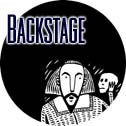
Comment
on this story
|
|

Translations lyrically examines dialect and language
by George Logan
Ireland has become such an integral part of Anglo-American culture that we've come to think of Irish as sort of English, but cuter, with leprechauns and shillelaghs and pints of Guinness. We may forget that, less than two centuries ago, as Europe and America were rapidly industrializing with steam engines and railroads, most Irish still spoke no English. They spoke Gaelic, which isn't just a dialect, but a language so different that many of its words don't transcribe into English.
It posed a challenge for British imperialist mapmakers. That's the central theme to Translations, a play set in Baile Baeg, a remote Irish village, in 1833.
The playwright is Brian Friel, an Irishman now in his 70s who has only recently drawn mainstream attention through the play and movie Dancing at Lughnasa. Written in 1980, Translations is an earlier work, and widely regarded among Friel's best.
The redoubtable Actor's Co-Op—Knoxville's most dynamic and versatile community theater—is known for its unusual venues. They'll play nearly anywhere except a theater. This time they return to Jackson Ave. Antiques, an empty industrial space on the second floor, in the back. (Come on in, even if the sign says CLOSED.) About 50 folding chairs, plus a few mismatched barstools, face the plain stage. For them, it's perfect.
Much of the play deals with the cultural barriers between the English, represented by two red-coated soldiers, and eight townspeople, most of whom speak only Irish.
Each of the townspeople react to the unaccustomed British presence in his or her own way. Pragmatic Owen (Ross Singer), a native who has learned English well enough to become a translator, tries to get along in the middle, even when it means answering to the name "Roland" and sugar-coating the British demands in his translations. His brother Manus, by contrast, is uncompromising in his hatred for the English and their language, even though he's one of the few who understands it. Hugh, their father (Jay Doolittle), is perhaps the play's most affecting character, the only one who sees the big picture. His lines are poetry, insightful and funny.
The traditional Irish connection to classical Rome and Greece seems simple to Hugh. "We feel closer to the warm Mediterranean," he explains to the Brits. "We overlook your island."
The script raises a big technical problem, of course, and that's how to represent different languages in a way a monolingual audience can understand. In Translations, Gaelic is represented by Irish-accented English which is, I guess, the most sensible way to handle that dilemma. The talented and mostly well-seasoned cast take to their Irish accents enthusiastically. Who can blame them? After all, it's fun to speak with an Irish accent, and to do it loudly and emphatically. In fact, I'm proofing this column in a thick Irish brogue right now, and I'm having a great time.
However, the lilting, trilling Irish brogue is not ideal for comprehension by Americans, even us Irish-Americans. For the first half-hour of Translations, I was fairly baffled by the dialogue, losing about every seventh word. I'm not in a position to judge the authenticity of the Irish accents—they mostly rang true, actually—but it was nearly as hard to understand as real Gaelic. Complicating it further is that it opens in a classroom where they've been learning Latin, and several are happy to shift into Latin occasionally—Latin with an Irish accent.
As a result, at the end of the first act I wasn't certain what was going on. The British persecuted my own ancestors, but the other night I was a little relieved to see guys in red jackets show up, just because I could understand what they said. Greg Congleton plays Lancey, the imperious commanding officer who has little interest or patience for things Irish. He's a little disgusted with his subordinate Yolland (Andrew Miller), a budding Irish romantic, a sort that's likely to fall in love with somebody like Maire, the young Irish beauty who speaks only a few disconnected words of English.
The presence of Englishmen and a translator makes the balance of the play more comprehensible. The second and third acts have enough humor and pathos and mystery to make the first act worth puzzling through.
Interweaved into this comedy that evolves into a tragedy are subplots involving eccentrics of a sort you're likely to find in a small, remote community. Among them is Jimmy Jack, an Irish version of a nerd, played by Clarence Brown veteran Zack Allen. The nervous classical scholar is hopelessly in love: an unrequited romance with the Greek goddess Athena.
The venue, of course, is in an old railroad warehouse, and the stage is at the back, on the railroad side of the building. During the two-hour play at least four trains ran by, blowing loud horns and clacking down the Norfolk-Southern tracks. It caused the players to pause occasionally. But it didn't intrude. Hugh paused, in the middle of a soliloquy, as if he could hear the train coming, as he spoke of the fact that a people should preserve their stories, but never stop reinterpreting them for changing times. Trains aren't part of the story, but their early 19th-century technology still seems to signal relentless change. It fit, somehow.
Translations leads us into more and more interesting ideas as it works it way down the track, helping us realize that hand-in-hand with the inevitability of change is the fact that the past is always with us, and a culture never dies. That's a lesson the British never quite figured.

February 17, 2000 * Vol. 10, No. 7
© 2000 Metro Pulse
|